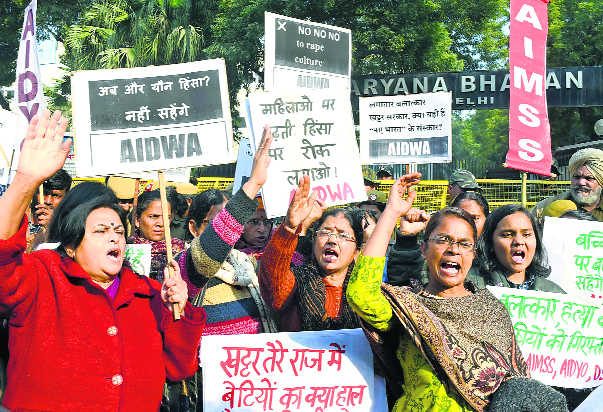
Enough is enough: Every incident of crime should make us rise as a society.
Rashmi Kalia
Academic
All too often, and sadly so, the anger we feel in the aftermath of a brutally insensitive incident goes nowhere. The anger subsides after a passage of time or is subsumed in our pursuit of things that are mundane, but are crucial to our existence. Predictably, we took to the streets when the brutal Nirbhaya gang rape and murder took place, just as we posted our angst wherever we could when eight-year-old Asifa Bano was brutally raped and murdered. However, even as India tries to make its judicial system more efficient in dealing with sexual assaults against women, there are pressing concerns whether these ordinances will ever bring about a change that will make this country a safer haven for women, of all ages.
The formation of the Justice Verma Committee, a panel of three legal experts appointed in the wake of fierce street protests after the Nirbhaya case to recommend legal reforms and other ways to reduce sexual violence, gave Indian women the "audacity to hope" that they will be able to reclaim an existence that will protect them from sexual violence. However, that audacious hope was short lived. The Nirbhaya case has been replaced by much more gruesome and disturbing incidents of sexual assault against women that continue to haunt our collective conscience.
Karuna Nundy, a prominent Supreme Court lawyer, who contributed to the drafting of the country's "anti-rape" laws and was one of the wide swath of people that the Verma Committee consulted, has talked of the "shock" that she felt when the manifesto of freedom that the Verma committee prepared, after weeks of consultations, was put in storage by the government. The ordinance that was finally issued incorporated a few recommendations of the commission. One of the wins of the ordinance, that was finally issued, was to make police officers criminally accountable for the reporting of sexual violence. In the present law, if law officers fail to report a sexual assault complaint, they themselves are criminally liable. Also, stalking and voyeurism were included in the list of violations.
In terms of the defeats of the ordinance, in the words of Karuna Nundy, "Well, there were many. We've still got a long way to go."
In India, almost every brutal case of sexual assault that is highlighted by the media is followed by rhetorical discussions by experts on various channels, recommending stringent punishments for the offenders, discussions on the issue of capital punishment for the sex offenders and an unleashing of a plethora of expert opinions on why India remains at the top when it comes to sexual offences against women. Despite all this, why is it that India has failed to find pragmatic solutions to curb sexual assault against women?
To devise any effective solutions to curb sexual assault, we, as a society, have to first redefine the act of rape in our minds. As suggested by numerous studies, lust is only a component of sexual violence. Sexual assault, disturbingly, is more about an assertion of power and control. It is a manifestation of our patriarchal society that considers sexual violence as a befitting way of physically 'punishing' women. If India has to ever control its rising incidence of sexual violence, it has to acknowledge the deep roots of patriarchy in this country that make violence against women in varied forms, verbal, emotional and physical, possible and permissible.
Despite the progress India has made, it still remains a mix of the new and the old, a country that has brought a few positive, but a lot of problematic changes for women. Despite industrialisation, globalisation and modernisation, India still largely remains a patriarchal society where a combination of family, caste, community and religion reinforces, and lends legitimacy, to the patriarchal values. The media, despite the active and admirable role it plays in shaking the public conscience whenever there is a case of brutal violence against a woman, sadly continues to perpetuate the stereotypical images of women through advertisements and popular television shows.
If India has to ever control violence against women, it has to address patriarchy like a "public health concern", in the words of Karuna Nundy, that needs agents who raise public awareness and spread the message about the disasters that it results in. Instead of shedding tears over the brutalised bodies of countless women, the Indian society needs to collectively endeavour to curb patriarchy in our every daily lives by encountering it as 'a specific psycho-sociological totality which is encountered in social and psychological structures.' Only when we resist gender discrimination in all its manifestations can we expect to control violence against women, in all its varied forms.
Unless we employ all agents of socialisation like the family, mass media and popular media to promote gender equality, it is unlikely that a social transformation will ever take place that will dismantle patriarchy in our society. Also, any legislations imposed by the government are ineffective unless and until they are accompanied by changes in the 'culture of institutions' that hold the key to transformation in society. These institutions include religion as practised, family, marriage, judiciary and the media.
It's time that every crime against women in this country should be treated as a national shame. Every incident needs us to rise as a society and say that this is not okay for us as a society. Enough is enough.



























